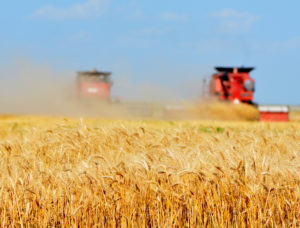AgriLife Research project to examine, educate on organic wheat systems
Writer: Kay Ledbetter, 806-677-5608, [email protected]
Contact: Dr. Curtis Adams, 940-552-9941, [email protected]
VERNON – Organic wheat and beef may not be for everyone, but one Texas A&M AgriLife team is going to make sure producers in Texas know more about the possibilities than they currently do.

Dr. Curtis Adams, Texas A&M AgriLife Research crop physiologist at Vernon, will lead a new project funded by the U.S. Department of Agriculture’s National Institute of Food and Agriculture in the Organic Transition Program.
“Introducing Organic to Producers of Grain-Only and Dual-Purpose Wheat Cropping Systems of Northern Texas” is an integrated grant project that includes research, Extension and education components, Adams said.
“We’re very excited about this project because we expect that it will open doors to producers that haven’t been available before,” he said. “Many producers have seen organic agriculture as a complicated process with a lot of challenges, but we hope to make the process simpler.”
He said the project area extends from the wheat-growing regions of the Texas Panhandle to west of Dallas.
“While this region is nationally recognized for its wheat production and stocker cattle wheat grazing systems, there is virtually no organic agriculture here,” Adams said, estimating there were only about 10 farms certified as organic in this area.
Collaborators include Dr. Bill Pinchak, AgriLife Research animal nutritionist in Vernon, who will facilitate the grazing measurements and animal gain; Dr. Emi Kimura and Dr. Jourdan Bell, AgriLife Extension agronomists in Vernon and Amarillo, respectively, who will conduct the Extension outreach and education component; Dr. Seong Park, AgriLife Research economist in Vernon; and Dr. Anil Somenahally, AgriLife Research soil microbiologist in Overton.
“Organic is one of the fastest growing areas of agriculture in terms of consumption,” Adams said. “But Texas has not taken advantage of the growth in that sector like other states have.”
He said suppliers of organic wheat and organic beef are having a hard time finding adequate supplies to meet their demand. One company, Ardent Mills of Colorado, has indicated it would source organic wheat products across a large region that includes Texas, but hasn’t been able to get much supply from this state.
“Arden Mills is running a private initiative to increase organic wheat production in this region, offering some incentives to producers, and we have teamed up to help connect them with producers in Texas,” Adams said.
Adams said his cropping system research will begin with a cover crop in spring 2018 and take place on 100 acres of AgriLife Research’s Smith-Walker ranch 10 miles south of Vernon.
“In the research, transitional organic systems will be directly compared to conventional systems,” he said. “Organic management will include application of composted manure and summer cover crops to supply fertility, crop rotation, tillage and cultural practices to control weeds. The conventional side will include summer fallow, the use of synthetic fertilizers, tillage and chemical weed control.
“Since the research has both grain-only and grazing components, we wanted the experiment to occur on a large field scale, which is the only way to provide results directly transferable to producers,” Adams said. “We will be able to tell producers how all management aspects come together to affect yield, animal gains, the soil and their bottom line.”
One of the problems, he explained, is once a producer cuts off the use of chemicals, there is a three-year transition period before the farm can be certified as organic. This has been a barrier to adoption of organic agriculture because it is risky for a producer. The lower-input organic scenario could decrease yields, but the producer can’t realize the organic price premium for three years.
“The research portion of the project has been designed to generate data that will clarify the benefits and risks to producers during and following the organic transition period,” Adams said.
There’s also an environmental side to organic agriculture that will be attractive to some producers, he said.
“We will look at the soil and microbiology shifts in response to organic management practices to give us some understanding of the health of the system and its environmental impact,” Adams said.
“We know organic is not for everyone,” he said. “But we want to bring information to the table and let producers make decisions themselves. We will hold two AgriLife Extension workshops in the second year of the project, one in Vernon and one in Amarillo, to provide intensive education on organic agriculture to those who are interested.”
The workshops will focus on cultural practices, organic regulations, incentives and certification fees, and also offer producers a chance to meet with potential marketers such as Ardent Mills, he said.
“As a part of our AgriLife Extension efforts, we will run preliminary economic numbers on how we expect organic wheat to work in this region and then will revise those after three years based on the outcomes of our research,” Adams said.
Additionally, the educational component of the project will be directed toward regional higher education. Team members Kimura and Bell will work with Michael Schoppa at Vernon College in Vernon and Dr. Brock Blaser at West Texas A&M University in Canyon to develop a curriculum section on organic agriculture.
“This will help give students in the region a more comprehensive look at agriculture to include organics,” Adams said.


